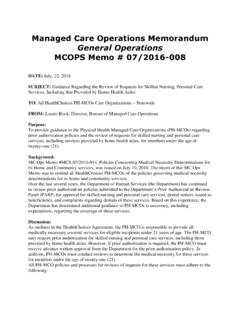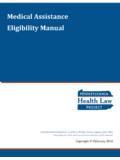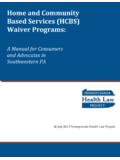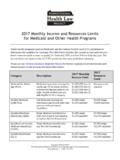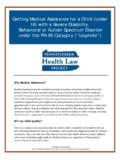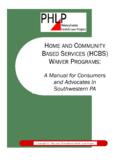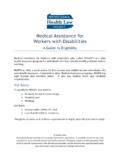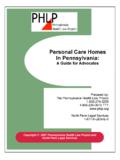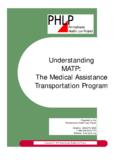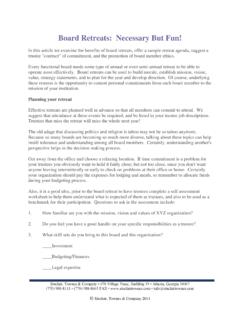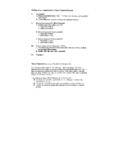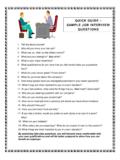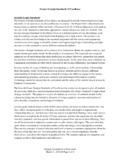Transcription of Email: letter of medical necessity - Helping People …
1 Writing a letter of medical necessity A Guide for Physicians Created by the Pennsylvania Health Law Project Updated September 2010 Under Pennsylvania medical As-sistance, a service is medically necessary if it meets any one of the three standards below: The service or benefit will, or is rea-sonably expected to, prevent the on-set of an illness condition, or disabil-ity. The service or benefit will, or is rea-sonably expected to, reduce or ame-liorate the physical, mental, or devel-opmental effects of an illness, condi-tion or disability. The service or benefit will assist the individual to achieve or maintain maximum functional capacity in per-forming daily activities taking into ac-count both the functional capacity of the individual and those functional capacities that are appropriate for in-dividuals of the same age. Website: Helpline: (800) 274-3258 email : Philadelphia 123 Chestnut St., Suite 400 Philadelphia, PA 19106 Pittsburgh 415 East Ohio St.
2 , Suite 325 Pittsburgh, PA 15212 Harrisburg 1414 N. Cameron St., Suite B Harrisburg, PA 17103 A good letter of medical necessity is key to appealing denied services. This bro-chure explains how to write a good letter of medical necessity . Be clear; utilize medical facts. Above all avoid anger, snide comments, criticism of managed care or the health care system. Be posi-tive and explain why you feel the patient needs what you prescribed. 1. Say who you are (primary care physi-cian, specialist), how long you have known the patient, and the service which you are requesting. 2. State, using the language of the law , why the service is medically necessary. Ex-ample: Jane Doe needs ongoing physical therapy because I expect it to assist her in achieving maximum functional capacity. Us-ing the language of the law is not plagiarism! 3. Use all parts of the legal definition which are relevant to your patient. Remember: your judgment, by itself, does not constitute medi-cal necessity .
3 4. Expand on each statement to give sup-porting medical evidence. Evidence can be from your chart, from consultant letters, or from conversations with family members. Writing a letter of medical necessity : a step by step guide with examples 5. Give specifics which are helpful in ex-panding on the legal definition: With as much detail as possible, explain how it will prevent an illness or dis-ability. Refer to medical articles or lec-tures. Review failed treatments. Con-sider information available to you about the patient, such as compliance with other regimens, family and home sup-ports, or coping skills, which the insurer may not know. Be specific about goals. With as much detail as possible, ex-plain how it will ameliorate the physi-cal, mental, or developmental effects of the patient s illness. Cite past suc-cesses with the treatment. Cite recent medical articles. Include letters from consultants. Review failed treatments and address the insurer s suggested treatments.
4 Be specific about psycho-logical factors that are relevant to your chosen treatment. Provide information you have which a distant administrator may not know. With as much detail as possible, ex-plain how it will assist the patient to maintain functional capacity. Include letters from physical or occupational therapists. Cite conversations with fam-ily members or other treating physi-cians. Include journal references on un-usual or new treatment modalities. Conclude with repeating your prescription and the medical consequences which you believe will result if the prescription for medications or services is denied. Examples of specific data which may be helpful: Review previous treatments you have tried, what results they produced, and what led you to change them. Be as specific as possible. If the insurer has suggested alternatives, ad-dress each one of these without anger. If they seem possible but you consider them to be second or third choice after your recommen-dation, acknowledge that and explain why.
5 If you have had particular success with the treatment you are recommending which the payor or other physicians might not be aware of, document this success. If you would agree with the payor in general in a case such as this, but feel this is a special situation, acknowledge this and explain the situation. "Ordinarily I only prescribe generic medications but I have been unsuccessful in challenging the patient s belief that all other medications make her ill." If you are seeking approval for durable medi-cal equipment, check the Medicare website or commercial providers to review criteria for du-rable medical equipment. This will often clarify the standards which are being used, and al-low you be more specific about why your pa-tient meets these requirements or should be an exception.
